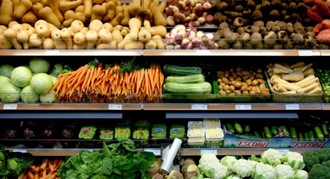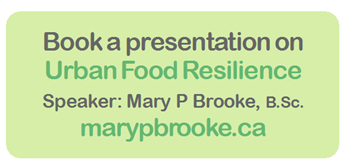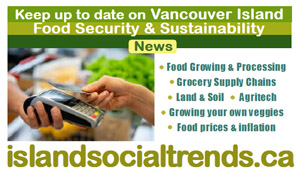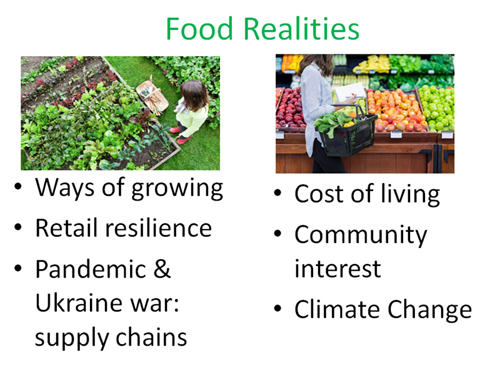
Sunday October 29, 2023 | LANGFORD, BC
Editorial by Mary P Brooke, B.Sc. | Island Social Trends
For sure, grocery prices should be lower — they’ve been exceptionally high for nearly two years now and the Bank of Canada does not see them falling as quickly as might be expected.
And yes, food banks have become an essential component of food security in Canada. Recent Food Banks Canada statistics show the highest use of food banks in recent months by Canadians, ever. That includes people who are employed, and families with children.
Urban food resilience leadership:
Now it’s time for a push to achieve urban food resilience in Canadian cities. To achieve this, municipalities need to show leadership in encouraging people to grow and share food.
This goes beyond what we all know and understand as the local community garden. Usually that sort of activity is made possible by garden enthusiasts. That’s awesome. Many municipalities already support organized non-profit community food-growing gardens. Well done.
Now it’s time for urban residents — in all types of households — to each do their small part toward food resilience. That could mean a large pot that grows some potatoes or a full backyard with a variety of salad and dinner vegetables, an everything in between (it’ll feel like a hobby but also add to a few meals over the season). Even a few herbs growing on your indoor windowsill is a start (good nutritional contributors).
Municipal equation:
The role for municipalities in all this is a simple equation: Space + Normalization = Boost in food resilience.
The space component is structural and driven by bylaws; the social normalization component makes it ‘okay’ if not desirable to be active in food growing at one’s home location; that takes active leadership.
By all means loop in provincial and federal governments through grants and other resources. Yes, it might seem like ‘downloading’ to the municipal level but where else does the freshest food grow but local?
Developers in the loop:
Municipalities need to provide spaces for food growing.
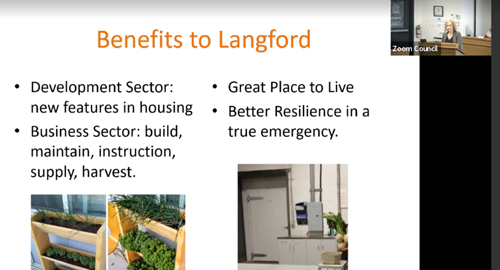
Developers should be required to include food-growing spaces at ground level of new developments and to supplement that with proper structural supports for indoor growing spaces including on patios and balconies. Bylaws to require this are next-step in urban planning.
Social infrastructure:
Municipalities need to provide community leadership for food growing. Not just tossing grant money toward pop-up non profit organizations, but encouraging local residents to engage more directly with the sources of their household food.
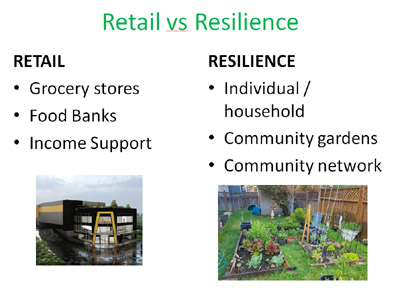
That could include a learning hub in the community or online, with a web portal to support that. Specialized consultants should be brought on to help achieve this.
Easing inflationary pressure:
None of this replaces the robust retail grocery store framework or the significant supply chain distribution and marketing system which supports the grocery sector. It’s a way for individual households to plug holes in their food needs from time to time. It might not be a lot, but it sets the right tone. All of this, especially, during times of inflationary pressures on people’s budgets.
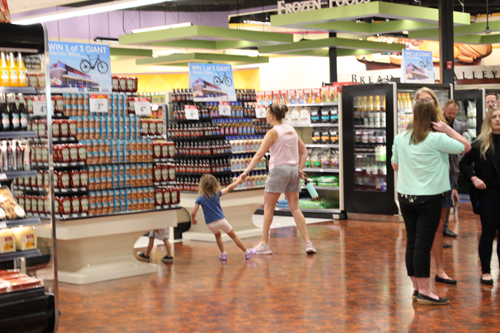
The very basics of life are becoming close to entirely unaffordable for many urban Canadians. No time like the present for cities and towns to shift the narrative to looking at local ways to buffer the burden of the cost of living.
And even if inflationary pressure eases off, healthier food grown very close to home is a nutritional plus at any time.
Environmental and economic impact:
Aside from the important aspects of growing healthy food and having it handy when needed, increasing the footprint of plants in neighbourhoods is good for the environment.
As well, local suppliers of all the many aspects of supporting food-growing would be active and supported through providing their products and services.
===== ABOUT THE WRITER:
Mary P Brooke has a B.Sc. in Foods and Nutrition with strong components of sociology, community education and business. She gives talks on urban food resilience.
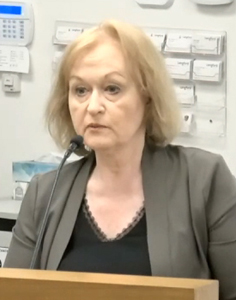
Municipalities and organizations may book Mary to address their group by emailing to mpbrooke@brookeline.com or visit marypbrooke.ca for more information.
Ms Brooke is the editor and publisher of Island Social Trends which includes a growing news section on Food Security.
===== RELATED:
- Bank of Canada: Food price inflation coming down with a lag (October 25, 2023)
- NDP still pushing for grocery price action (October 18, 2023)
- Collecting rainwater for your autumn veggie garden (September 17, 2023)
- Urban food resilience discussed by Langford committees (July 29, 2023)
- Urban food resilience directions in Langford (June 9,2023)
- Contributing to your own food security (October 10, 2022)
- Big yield for inaugural Royal Roads community garden (October 3, 2022)
- Food hub gains traction with suppliers, provides training, supports local farmers (August 8. 2022)
- Growing your own food in inflationary times (July 3, 2022)



